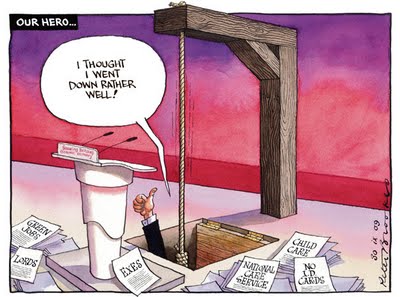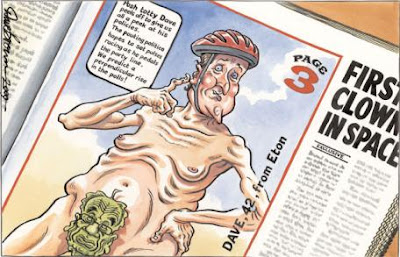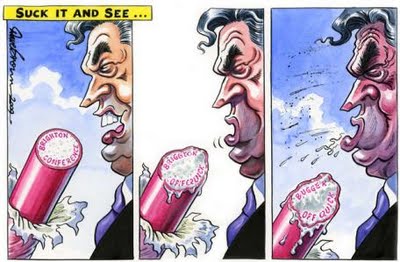 Last year, when Sarah Brown, clearly nervous, stood up in front of the Labour conference and introduced her husband's address, what was clearly an attempt to deflect criticism was viewed sympathetically, mainly as it was still by no means certain that he would be in the job for much longer after it. As it turned out, the speech, probably now best remembered for his put down of both Cameron and Miliband by saying it was "no time for a novice" was just about good enough to secure his leadership, at least until the disastrous local and European election results earlier this year where another major wobble took place.
Last year, when Sarah Brown, clearly nervous, stood up in front of the Labour conference and introduced her husband's address, what was clearly an attempt to deflect criticism was viewed sympathetically, mainly as it was still by no means certain that he would be in the job for much longer after it. As it turned out, the speech, probably now best remembered for his put down of both Cameron and Miliband by saying it was "no time for a novice" was just about good enough to secure his leadership, at least until the disastrous local and European election results earlier this year where another major wobble took place.
This year, Sarah Brown's appearance before Brown's speech, far from performing the role it was meant to, simply exaggerated the extended tragedy which has been his reign. What other response could there possibly be to her description of Gordon as "her hero"? Again, she was intended to act as a prophylactic, protecting him from scathing criticism. You can get away with doing this once; do it twice and you start to look cowardly, and this from the man trying to ram books about "courage" down our necks.
You can though understand why they wanted history to repeat. If last year's speech by Brown did just enough, then this year's didn't even come close. You can't deny that Brown delivered it with plenty of brio, hardly falling into the stereotype of someone so depressed and flailing that he needs to be on archaic, strong medication, but it was the content that so bitterly let him down. To call it a speech would, like Nick Clegg's effort last week, probably be insulting the medium itself. There was no theme, no connection. One of the first things you're taught when it comes to writing essays is that they must have an introduction, a middle and a conclusion, something which applies equally to public speaking. The latest innovation it seems when it comes to speeches by political leaders is to throw such outdated notions out of the window: no one other than wonks is going to listen to or read the things in full anyway, so you might as well just talk about one thing after the other, regardless of any connection between them until you've finished. Brown goes from the economy to attacking the Conservatives to the greatness of those ubiquitous "hard-working families" to the public services to back to attacking the Conservatives again, all of it wholly unconvincing.
This conference, if it is about anything, seems to be a collective gnashing of teeth that they have ever saw fit to defenestrate Tony Blair. Yesterday we saw the party finally falling in love with Mandelson, the nearest it now has to the great man himself. Brown, knowing that the last thing he can be is Blair, instead decided to emulate his policies. All those things we thought we'd seen the last of, such as the pointless counter-productive populism on "anti-social behaviour" are suddenly back as if they never went away. Sure, there were a few bones here thrown in an attempt to buy off those who had hoped that Brown would lead the party left-wards, the most obvious and also best example being the great believer in free markets suddenly deciding that the "right wing fundamentalism that says you just leave everything to the market and says that free markets should not just be free but values free" was wrong, but no one believes for a second that Brown intends to act on what he says in this area. Most disturbing was what some have already monikered as "gulags for slags", the shared housing for pregnant 16 and 17-year-olds, rather than putting them up in a council flat. Not only does this buy into a myth, that all you need to do is get pregnant while a teenager and you'll be set up for a life, but that also accidentally becoming pregnant when you're over the age of consent but not yet 18 is something that you should be punished for, not to mention considered to be too stupid or feckless to be able to look after the child either on your own or with the help of your own family without the state barging in. This sense of false victimhood and resentment against those "who will talk about their rights, but never accept their responsibilities" permeated an entire section of the speech. This just illustrates how successful the tabloids have been as painting Labour as friends only of immigrants and single mothers, and how the incredible idea that it's now the white middle classes who are the most discriminated against has become mainstream.If the idea of "gulags for slags" is chilling, in much the same way was Brown's declaration that "whenever and wherever there is antisocial behaviour, we will be there to fight it." It's worth remembering that the main indicator for so-called antisocial behaviour is not shouting at people on the street or the kind of low-level thuggery over an extended period which the Pilkingtons suffered, but teenagers daring to congregate together in public, doing nothing other than talking to each other. In some senses we've regressed past the Victorian dictum that children should be seen and not heard; now we don't want them even to be seen. Yet this war on childhood in general is, we are told, incredibly popular in focus groups, hence why it's back on the agenda. It doesn't matter that if you focus grouped bringing back capital punishment or permanently chipping sex offenders you'd also doubtless get an immensely favourable response, if a representative sample of the hoi polloi wants it, they'll get it. Or rather, they'll be told they're getting it, as that seems to be just as good as getting it.
On everything other than bringing back the Blair agenda, it was the tiniest most pathetic gestures which were the order of the day. ID cards won't then be made compulsory over the next parliament; MPs guilty of gross misconduct will be able to be recalled; and there'll be a commitment in the manifesto for a referendum on the alternative vote, the most piss-poor non-proportional system of voting other than first past the post. There was no vision here, no adjustment to the world as it is now is, just a repetition of past glories which the electorate are supposed to bask in and so reach the conclusion that the Conservatives would only mess it all up. This was exactly the stance they took in 1997: New Labour, New Danger, you can only be sure with the Conservatives. They were already doomed, but it doomed them even further. In line with that year, tomorrow the Sun declares that Labour has blown it, just as it switched support from the Tories back then. Marx it seems had it backwards: in this instance history is repeating itself, but as tragedy after farce.
Labels: Alistair Darling, authoritarianism, conference season, death of Labour, fall of Gordon Brown, Gordon Brown, Labour, Peter Mandelson, policy, politics





